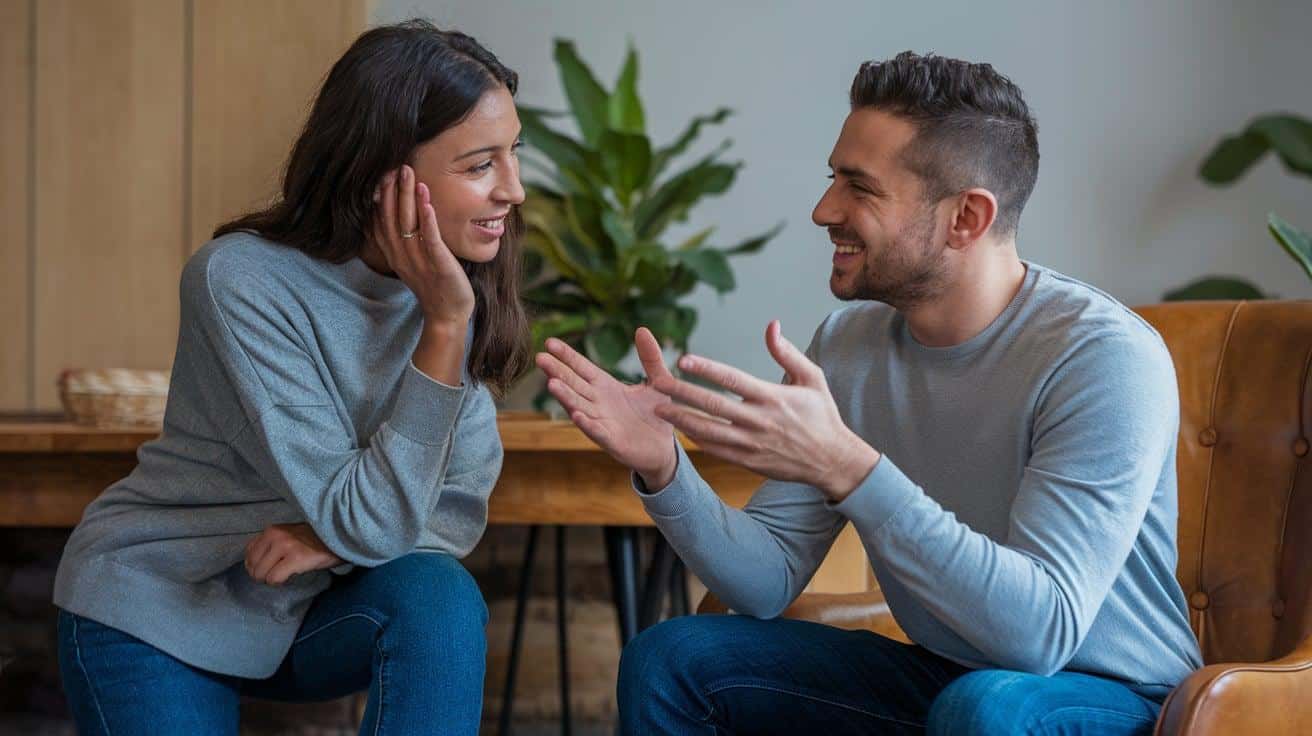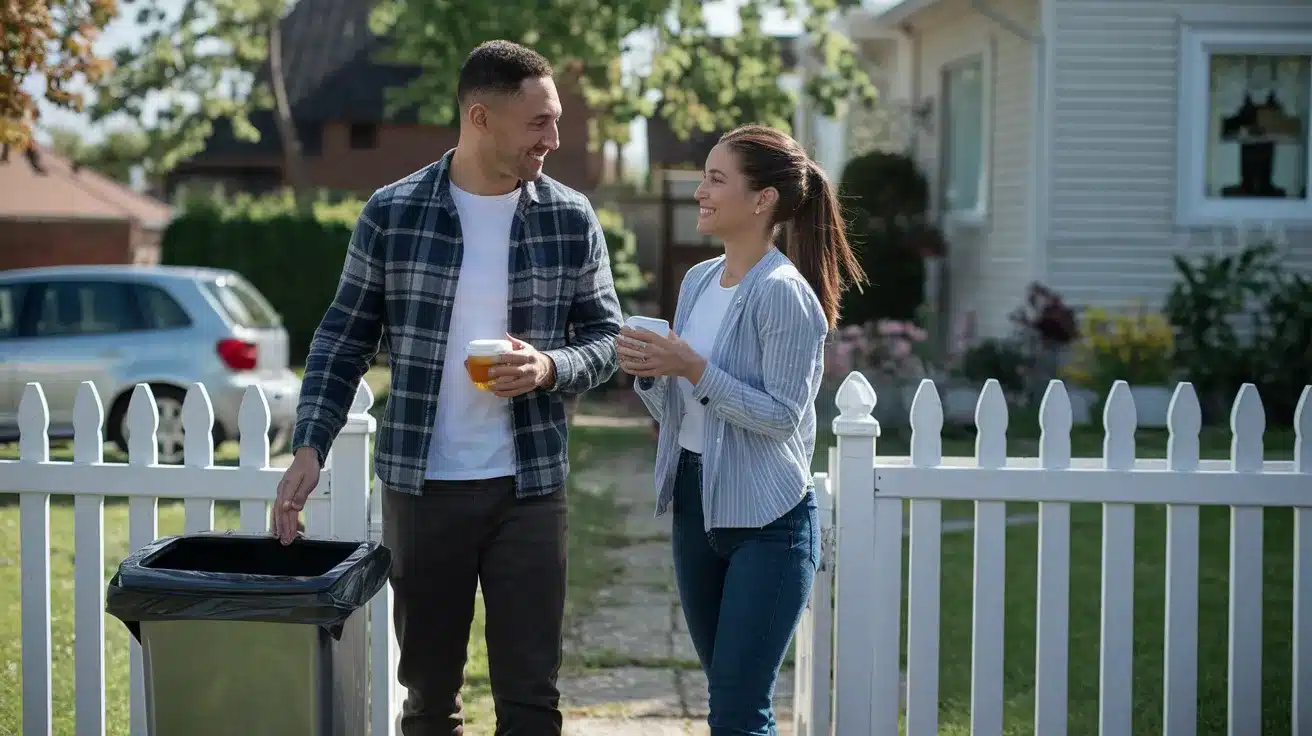Your attention snaps when trust breaks in a relationship. Many people struggle with feeling safe with their partners – a basic need for healthy bonds.
Safety in relationships matters more than we think. Without it, doubt grows and connection fades. You check their phone or worry when they’re late. Sound familiar?
You want to feel secure again, for openness without fears, for a relationship where both people feel protected and valued.
Keep reading to learn practical ways to build trust and security with your partner. This post offers clear steps to create safety in your relationship. We’ll show you how to talk openly, set good limits, and heal old wounds that cause worry.
Let’s build a stronger foundation for your relationship together.
How to Know if You Are Feeling Unsafe in a Relationship?
Is your stomach in knots when your partner walks in? This isn’t love – it’s fear.
Recognizing when you feel unsafe in a relationship is crucial. Your body and mind send warning signals before you fully understand what’s wrong. These signs are red flags waving for your attention.
Physical signs show up first. Your muscles tense when they enter the room. Your heart races during simple talks. Sleep escapes you. Food loses taste. Your body knows something’s off.
Emotional alarms ring loud too. Do you worry about their next mood swing? Hide your true self? Feel unable to speak freely? These aren’t normal relationship bumps – they’re warning bells.
Watch for these clear signals:
- Knots of fear when your partner is nearby
- Trust crumbling with each broken promise
- Your voice gets smaller as theirs grows louder
- Your feelings become their weapons
- Arguments spin in circles with no fix
- Friends and family fade from your life
Your gut knows. That twist in your chest isn’t just stress – it’s your inner alarm system. Listen to it.
These warning signs don’t always mean the end. But they do mean something must change. Spotting these signals is your first step toward better days or brave goodbyes.
Why Feeling Safe in a Relationship Matters?
Feeling safe with your partner forms the base of your bond. Safety goes beyond physical protection to emotional security and trust.
When you feel safe, you open up fully. You share fears and hopes without worry of judgment. This creates true closeness that casual talks cannot match. Trust grows when your partner treats your feelings with care. Each honest exchange adds strength to your connection. This trust helps you face challenges as a team.
Safety lowers stress in your daily life. Arguments happen less often. When they do, they focus on fixing issues, not hurting each other. Your body and mind relax in safe relationships. During hard times, safe couples turn toward each other for support. They grow stronger through troubles instead of growing apart.
Respect thrives naturally in safe relationships. Both people develop as individuals and as partners. You cheer each other’s success and comfort each other’s pain.
Without safety, relationships break down. People hide their thoughts. Small problems grow large. Distance replaces closeness. The bond becomes stressful rather than comforting.
What Are the Benefits of Feeling Safe in a Relationship?
When both partners feel secure, relationships thrive in several key ways:
- Stronger Emotional Connection: Safety allows partners to share their true selves. You reveal hopes and fears more openly. Small gestures gain deeper meaning. Walls come down gradually as trust builds. This honest exchange creates bonds that surface-level talks cannot match.
- Healthier Communication: Conversations improve when fear of judgment fades. You speak honestly without worry. You listen to understand, not to defend. Even difficult topics become easier to discuss. Problems get solved faster when both people feel safe enough to be truthful about issues.
- Increased Trust: Consistent actions build strong trust over time. Words match behaviors in safe relationships. When trust is solid, doubt decreases. You stop checking phones or questioning intentions. Mental energy shifts from suspicion to connection.
- Reduced Conflict: Arguments focus on issues, not personal attacks. You seek solutions instead of trying to win. You ask questions before making assumptions. Small misunderstandings clear up quickly before growing into major conflicts.
- Better Mental Health: Research shows secure relationships lower stress hormones. Your body and mind relax when you feel protected. Sleep improves. Worry decreases. You handle daily challenges better knowing someone supports you fully. This calm affects all areas of life positively.
Emotional safety creates a strong foundation that supports lasting happiness and stability between partners.
8 Ways to Create Emotional Security in a Relationship
Want a relationship where both hearts feel at home? Security isn’t luck – it’s built brick by brick. Here’s your roadmap to creating that safe space where love can truly grow.
1. Establish Clear Boundaries

Good fences make good neighbors – and even better partners. Your relationship needs clear lines that both of you understand and respect. Talk openly about what feels right and what doesn’t. How much alone time do you need?
Which topics make you flinch? When does touch comfort versus crowd you? When you both honor these personal limits, you create a space where neither person feels pushed or pulled. Check in often – what felt right last year might shift as you grow together.
2. Promote Open Communication

Words build bridges between hearts. Create space where thoughts flow freely, without fear of judgment or quick fixes. Put down your phone, look into their eyes, and truly listen.
Ask questions that go deeper than “How was your day?“
Pay attention to what remains unsaid. When your partner knows their words won’t be used as weapons later, they’ll share their true self with you. The hard talks become possible when the everyday ones feel safe.
3. Be Consistent
Trust is built on a thousand tiny kept promises. The texts you send when you say you will. The trash taken out without being asked. The shoulder offered after a rough day.
Your steady actions speak volumes about your reliability. Words fade, but patterns remain crystal clear. Your partner’s brain is constantly asking: “Can I count on this person?” Answer yes with your daily choices, not just your big promises.
4. Show Empathy
Your partner’s feelings matter – even when you don’t understand them. When they hurt, resist the urge to fix or dismiss. Instead, step into their shoes for a moment. “That sounds really hard” can heal more than a hundred solutions.
You don’t have to agree with their view to honor their experience. Validation isn’t agreement – it’s recognition that their feelings are real. This simple act creates a shelter where vulnerable emotions can safely exist.
5. Encourage Mutual Respect

Treat your partner like someone whose opinion you value deeply. Watch your tone during fights. Skip the eye rolls and heavy sighs. Bite back words you know would wound.
Ask for their thoughts on decisions, big and small. Thank them specifically for ways they make your life better. When respect flows both ways, both people stand taller. Neither partner shrinks to make space for the other’s ego.
6. Build Trust Gradually
Trust isn’t built with grand gestures but with steady, reliable actions over time. Tell the truth, even when it’s uncomfortable. Keep their secrets safe. Show up when you say you will.
Each small moment of trustworthiness is a deposit in your relationship bank. Some people come with trust wounds from past relationships. Be patient if their trust grows more slowly. The strongest foundations are built stone by careful stone.
7. Be Accountable for Mistakes

We all mess up. The question is: what happens next? When you’re wrong, own it cleanly without excuses.
“I was wrong and I’m sorry” can heal what a thousand explanations cannot.
Talk together about how to avoid the same mistake twice. Show through actions – not just words – that you’re working to grow. Partners who can admit flaws create a soft place to land for two imperfect humans trying their best.
8. Create Shared Experiences
Time together weaves threads that strengthen your bond. Find activities that light up both your eyes and make them regular features in your life, such as morning coffee conversations.
Weekend hikes. Game nights with belly laughs. These shared moments create a bank of good memories that help carry you through harder times. They remind you why you chose each other when the daily grind makes it easy to forget.
Conclusion
Safety forms the heart of a healthy relationship. Throughout this post, we’ve seen how trust and security create bonds that last. When you feel safe with your partner, you share more openly.
You talk honestly about needs and concerns. You build trust through small, consistent actions each day. Remember that clear boundaries protect both people. Open talks make hard topics easier. Being reliable shows your partner they can count on you.
These skills take practice. Some days will be harder than others. But the effort pays off in deeper connections and fewer conflicts.
By focusing on these basics, you create a relationship where both people can grow. A place where worries fade and true closeness can develop. Trust and security – the foundation stones of love that stands the test of time.









